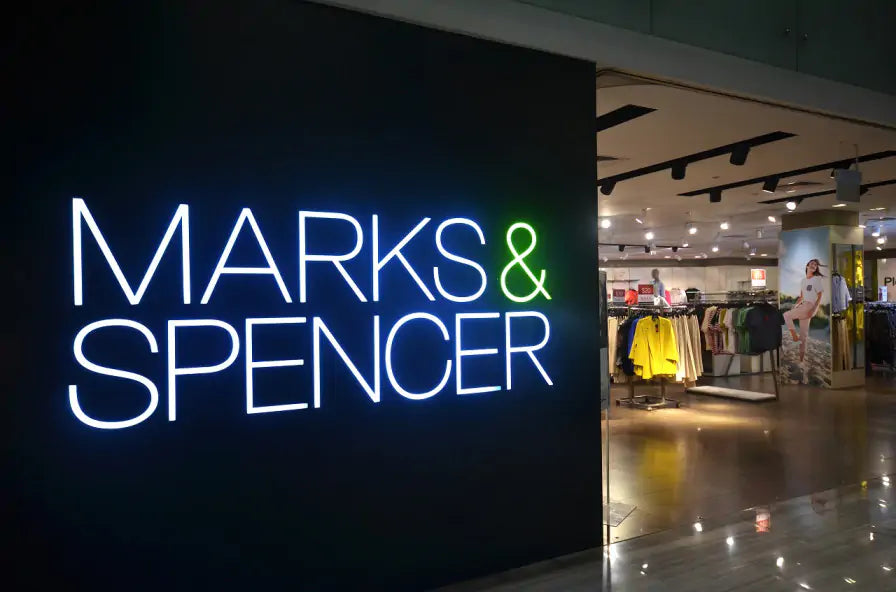Your basket is currently empty.
Shop NowRecycling in Focus - Marks and Spencers

Recycling in Focus: Green Champions
Marks and Spencer
If you think that big companies are all about making profits and they have no conscience, this should make you think again!
Marks and Spencer have a 5-year plan to become the world’s most sustainable retailer, and the scheme reaches every part of their business.
Plan A
Plan A is the 5-year plan that the company have put in place to help them achieve their sustainability goals. The plan involves sourcing materials and products responsibly, reducing waste and helping communities, both locally and globally. The company has achieved their aim of making their UK business carbon neutral and now they have a new set of environmental goals, which they are working towards by implementing the following schemes:
Recycling
The company actively recycles and reuses key materials;
Nylon is recycled. Leftover fibres are cleaned and spun to make new material. This means less waste and a much better use of resources.
Plastic is recycled from used or leftover materials. The plastic is cleaned and repurposed to make new products.
Wool is recycled from leftover fibres. The wool is sorted, cleaned, and spun to make new fabric.
Polyester is extracted from plastic bottles and other unwanted or used products to make new material that is used in clothing and their home product range.

Christmas card recycling
Every year, Marks and Spencer ask customers to bring their old Christmas cards to their local store for recycling. For every 1000 cards collected, the company plants a tree. Since 2012, over 32 million cards have been recycled. That equals 32,000 trees planted.
Sustainable packaging development
The trays that ready meals and other microwaveable products come in might be convenient, but they pose a problem when it comes to recycling. These trays are made from a plastic called CPET, which is usually black. They often can’t be detected by the sorting equipment which is used in recycling plants and so they can end up in landfill. This is bad news, since around 1.3 billion of these trays are used in this country each year. Marks and Spencer are working with packaging and recycling companies to trial a new type of detectable plastic packaging. 2 million of these trays have already been made and will be trialled over a 4-week period. A recycling company will then assess how detectable they are and whether they can be recycled and reused to make new trays. If this new plastic is viable, this could mean that over 1 billion more items of packaging can be recycled every year.
Tackling food waste
The company has set itself an ambitious target of reducing its food waste by 20% by 2020. The aim is to put surplus food to good use, and one way they are doing this is by redistributing unsold food to local charities, food banks, community centres, cafes, and hospices. The items they donate include fruit and vegetables, pasta, and cereals.
Recycling clothing
Marks and Spencer encourages customers to bring their unwanted clothes into their local store and put them in designated bins to either be given to Oxfam, or sent to underprivileged people around the world. Anything that is not fit for resale gets made into new fabric. Since they started the initiative, £5.5 million has been raised for charity. It has also resulted in much less clothing ending up in landfill. The company aims to recycle as many items of clothing as they sell, a whopping 350 million garments!

Putting sustainability into practise
The Marks and Spencer store in Cheshire Oaks is their largest and one of the world’s most sustainable outlets. This is achieved by focusing on recycling, sending zero waste to landfill and managing water consumption among other things.
The Monk’s cross store in York has a massive 60,000 litre tank for recycling rainwater, their shelving is made from recycled materials and no waste went to landfill during the construction of the building.
The Ecclesall Road Simply Food store in Sheffield was built using sustainable materials. The bricks were reclaimed from an old mill and all the waste produced when the store was being built was recycled.
The Stratford store in East London was built with responsibly sourced timber and recycled tiles and plasterboard.
Corporate responsibility is necessary
Marks and Spencer are a shining example of how a big company can operate responsibly and with consideration for the environment, and the community in which it operates. A lot of big companies get a bad press, but it’s nice to hear of big business using its influence for the greater good.
